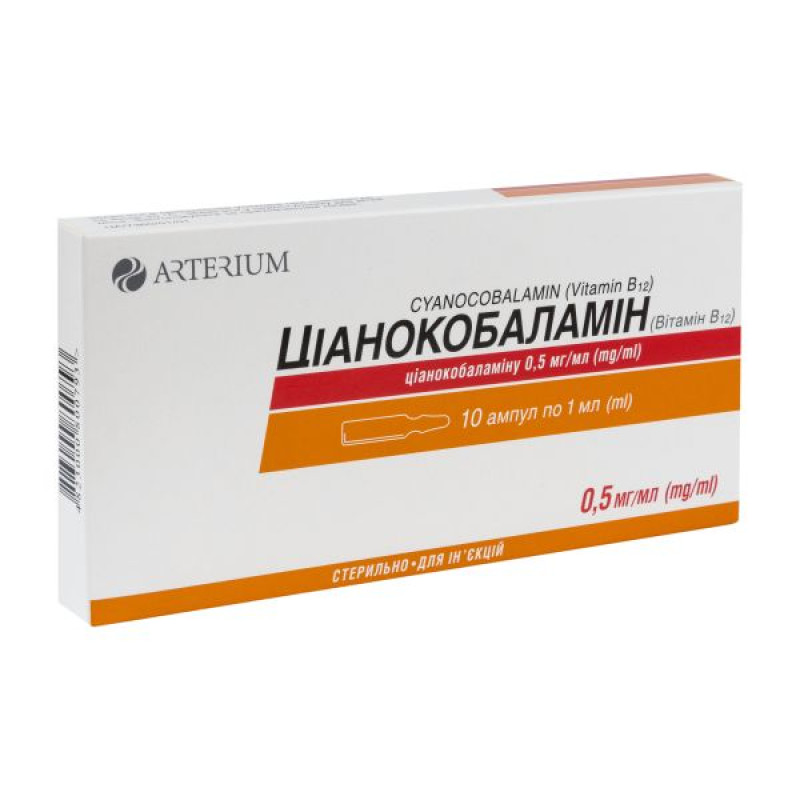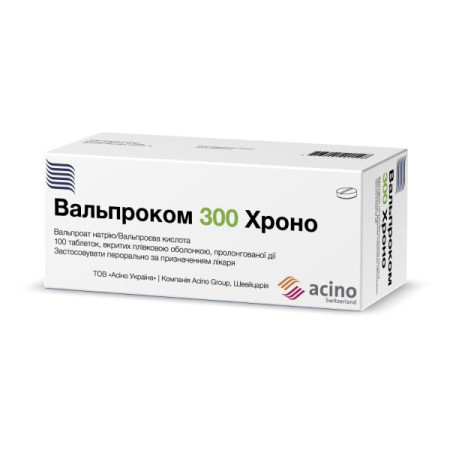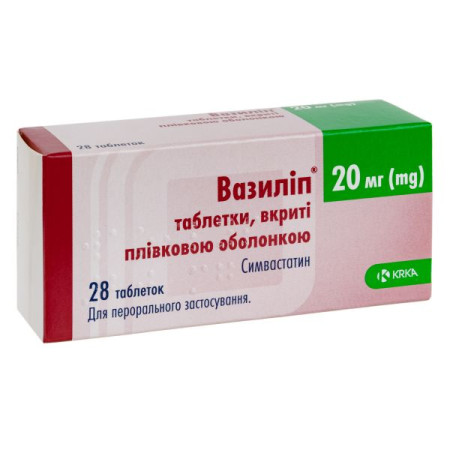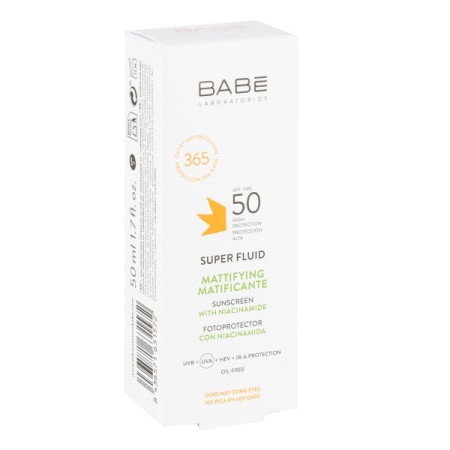Cyanocobalamin (Vitamin B12) solution for injection 0.05% ampoule 1 ml No. 10

Instructions Cyanocobalamin (Vitamin B12) solution for injection 0.05% ampoule 1 ml No. 10
Composition
active ingredient: cyanocobalamin;
1 ml of solution contains: cyanocobalamin in terms of 100% substance - 0.5 mg;
Excipients: sodium chloride, water for injections.
Dosage form
Solution for injection.
Main physicochemical properties: transparent, bright red liquid.
Pharmacotherapeutic group
Vitamin B12 (cyanocobalamin and its analogues). ATX code B03B A01.
Pharmacological properties
Pharmacodynamics
Cyanocobalamin, as a metabolite, activates the metabolism of carbohydrates, proteins and lipids, participates in the synthesis of labile groups, in the formation of choline, methionine, nucleic acids, creatine, promotes the accumulation of compounds with sulfhydryl groups in erythrocytes. As a growth factor, it stimulates bone marrow function, which is necessary for normoblastic erythropoiesis. Cyanocobalamin contributes to the normalization of impaired liver and nervous system functions, activates the blood coagulation system, in high doses causes an increase in thromboplastic activity and prothrombin activity. Reduces the concentration of cholesterol in the blood. Increases the ability of tissues to regenerate.
In humans and animals, it is synthesized by intestinal microflora, but this synthesis does not meet the need for the vitamin, and the body obtains additional amounts from food.
Pharmacokinetics
When administered parenterally, vitamin B12 quickly enters the systemic bloodstream. In the blood, it binds to transcobalamins I and II, which transport it to the tissues. It is deposited mainly in the liver. Plasma protein binding is 90%. The time to reach maximum concentration (TCmax) after subcutaneous or intramuscular injection is about 1 hour. It is excreted from the liver with bile into the intestines and is reabsorbed into the blood. The half-life (T½) from the liver is 500 days. With normal kidney function, 7-10% is excreted by the kidneys, about 50% with feces; with reduced kidney function, 0-7% by the kidneys, 70-100% with feces. Penetrates the placental barrier.
Indication
Treatment of malignant, posthemorrhagic and iron deficiency anemias, aplastic anemias in children, nutritional anemias caused by toxic substances and drugs associated with vitamin B12 deficiency, regardless of the cause of the deficiency (gastric resection, helminthic invasions, impaired intestinal absorption, pregnancy). Polyneuritis, trigeminal neuralgia, radiculitis, causalgia, migraine, diabetic neuritis, amyotrophic lateral sclerosis, cerebral palsy, Down's disease, alcoholic delirium. Use for dystrophy in children, after infectious diseases, for sprue (together with folic acid), liver diseases (hepatitis, cirrhosis), radiation sickness, psoriasis, dermatitis herpetiformis, neurodermatitis, photodermatoses.
Contraindication
Hypersensitivity to the components of the drug. Erythremia, erythrocytosis. Neoplasms, except cases accompanied by megaloblastic anemia and vitamin B12 deficiency. Acute thromboembolic diseases. Angina pectoris of high functional class.
Interaction with other medicinal products and other types of interactions
Aminoglycosides, salicylates, antiepileptic drugs, colchicine, potassium preparations reduce the absorption of the drug and affect its kinetics.
When used simultaneously with kanamycin, neomycin, polymyxins, tetracyclines, the absorption of cyanocobalamin decreases.
Pharmaceutically incompatible with ascorbic acid, heavy metal salts (inactivation of cyanocobalamin); thiamine bromide, pyridoxine, riboflavin (the cobalt ion contained in the cyanocobalamin molecule destroys other vitamins).
Thiamine – the risk of developing allergic reactions caused by thiamine increases.
Chloramphenicol – reduces the hematopoietic response to the drug.
Citamen – with simultaneous use, the effect of Citamen is reduced.
Oral contraceptives – reduce the concentration of cyanocobalamin in the blood.
Application features
Cyanocobalamin should not be used with drugs that increase blood clotting. During treatment with cyanocobalamin, it is necessary to monitor peripheral blood parameters: on the 5th-8th day of treatment, determine the reticulocyte content, iron concentration. The number of erythrocytes, hemoglobin and color index should be monitored for 1 month 1-2 times a week, and then 2-4 times a month. Remission is achieved when the number of erythrocytes increases to 4.0-4.5x1012/l, when normal erythrocyte sizes are achieved, aniso- and poikilocytosis disappear, and the reticulocyte content normalizes after a reticulocyte crisis. After achieving hematological remission, peripheral blood monitoring should be carried out at least once every 4-6 months.
In people with a tendency to thrombosis and patients with angina pectoris, caution should be exercised during treatment and blood clotting should be monitored.
If there is a tendency to develop leukocytosis and erythrocytosis, the dose of the drug should be reduced or treatment should be temporarily suspended.
This medicinal product contains less than 1 mmol (23 mg) sodium/dose, i.e. essentially 'sodium-free'.
Ability to influence reaction speed when driving vehicles or other mechanisms
During treatment, it is necessary to refrain from driving vehicles and engaging in potentially dangerous activities that require increased attention and speed of psychomotor reactions.
Use during pregnancy or breastfeeding
Cyanocobalamin should not be used during pregnancy (there is some evidence of the teratogenic effect of vitamin B12 in high doses) and during breastfeeding.
Method of administration and doses
Cyanocobalamin should be administered intramuscularly, subcutaneously, or intravenously, and in funicular myelosis and amyotrophic lateral sclerosis, also intralumbar.
Adults
In case of B12 deficiency anemia, the drug should be used in doses of 100-200 mcg (0.1-0.2 mg) every other day until remission is achieved.
When symptoms of funicular myelosis appear and in macrocytic anemias with damage to the nervous system, cyanocobalamin is used in a single dose of 400-500 mcg (0.4-0.5 mg) and more. In the first week, administer daily, and then at intervals of 5-7 days (at the same time prescribe folic acid). In severe cases, inject into the spinal canal, starting with a single dose of 15-30 mcg, and with each subsequent injection, increase the dose (50, 100, 150, 200 mcg). Intralumbar injections are given every 3 days, a total of 8-10 injections are required per course. During the period of remission, in the absence of phenomena of funicular myelosis, for
maintenance therapy should be prescribed at 100 mcg twice a month, in the presence of neurological symptoms - at 200-400 mcg 2-4 times a month.
For posthemorrhagic and iron deficiency anemia, prescribe 30-100 mcg 2-3 times a week.
In amyotrophic lateral sclerosis, encephalomyelitis, neurological diseases with pain syndrome, administer in increasing doses from 200 to 500 mcg per injection (with improvement - 100 mcg per day). The course of treatment is 14 days. In peripheral nerve injuries, prescribe 200-400 mcg once every 2 days for 40-45 days.
For hepatitis and cirrhosis, prescribe 15-30 mcg per day or 100 mcg every other day for 25-40 days.
For diabetic neuropathy, sprue, radiation sickness, administer 60-100 mcg daily for 20-30 days.
In case of vitamin B12 deficiency, treatment is intramuscularly and intravenously 1 mg every day for 1-2 weeks, maintenance dose is 1-2 mg intramuscularly or intravenously from 1 time per week to 1 time per month. The duration of treatment with cyanocobalamin and repeated courses depends on the course of the disease and the effectiveness of treatment.
Children
For posthemorrhagic and iron deficiency anemias, administer 30-100 mcg 2-3 times a week. For aplastic anemia in children, administer 100 mcg until clinical and hematological improvement occurs. For nutritional anemias in children, administer 30 mcg for 15 days.
For dystrophies in young children, Down's disease and cerebral palsy, prescribe 15-30 mcg every other day.
For hepatitis and cirrhosis, prescribe 15-30 mcg per day or 100 mcg every other day for 25-40 days.
Children
Use for children aged 3 years and over.
Overdose
Symptoms: pulmonary edema, congestive heart failure, peripheral vascular thrombosis.
Treatment: therapy is symptomatic.
Adverse reactions
On the part of the blood: hypercoagulation.
Cardiovascular system: tachycardia, pain in the heart area.
From the nervous system: headache, dizziness, nervous excitement.
Metabolic: acne, bullous rashes, nausea, sweating, purine metabolism disorders.
On the part of the immune system: allergic reactions, including skin manifestations, including hyperemia, urticaria, rash, itching, dermatitis, edema, including angioedema; respiratory disorders, including asthma attacks, anaphylactic shock, anaphylactoid reactions.
Gastrointestinal: decreased bowel movements.
General disorders: malaise, fever.
Local reactions, including hyperemia, itching, pain, swelling, induration, and necrosis at the injection site.
Expiration date
2 years.
Storage conditions
Store in original packaging at a temperature not exceeding 25 ° C. Keep out of the reach of children.
Incompatibility
When using cyanocobalamin with ascorbic acid, thiamine, and pyridoxine in the same solution, mutual destruction of vitamins occurs; with nicotinic acid, destruction of cyanocobalamin occurs; with riboflavin, accumulation of cobalt ions occurs.
Packaging
1 ml in an ampoule. 10 ampoules in a contour blister pack, 1 contour blister pack in a pack.
Vacation category
According to the recipe.
Producer
PJSC "Halychpharm".
Location of the manufacturer and its business address
79024, Ukraine, Lviv, Opryshkivska St., 6/8.
There are no reviews for this product.
There are no reviews for this product, be the first to leave your review.
No questions about this product, be the first and ask your question.


















